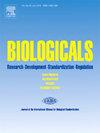Development and optimization of multiplex PCR for rapid detection of type I-F1 and type I-F2 Cas cluster genes in Acinetobacter baumannii
IF 1.5
4区 生物学
Q4 BIOCHEMICAL RESEARCH METHODS
引用次数: 0
Abstract
Polymerase chain reaction (PCR), especially the multiplex PCR assay, enables simultaneous detection of multiple genes and is highly effective for diagnostic applications. The CRISPR-associated (Cas) system consists of several genes, and complete gene clusters are essential for its activity; multiplex PCR is an excellent method for detecting these multiple genes. This study focuses on the development and validation of a multiplex PCR protocol for the specific detection of CRISPR-Cas subtypes I-F1 and I-F2 found in A. baumannii, which is classified as a critical ESKAPE pathogen. The multiplex PCR method achieved a 100 % detection rate for isolates containing Cas subtypes I-F1 and I-F2 in clinical A. baumannii isolates. Testing across various genera and Acinetobacter species confirmed the high specificity of the assay, with no false positives, establishing it as a reliable tool for large-scale clinical applications. Of the 96 clinical A. baumannii isolates analysed, 29.167 % (n = 28) were multiplex PCR positive for a CRISPR-Cas system. Among these, 71.43 % (n = 20) had subtype I-F1, while 28.57 % (n = 8) had subtype I-F2. No clear association was found between Cas subtypes and resistance to the tested antibiotics or carbapenem genes. This study provides a valuable tool for monitoring CRISPR-Cas systems and can aid in various experimental and novel strategies to manage multidrug-resistant A. baumannii.
快速检测鲍曼不动杆菌I-F1型和I-F2型Cas簇基因的多重PCR方法的建立与优化
聚合酶链反应(PCR),尤其是多重PCR,能够同时检测多个基因,在诊断应用中非常有效。crispr相关(Cas)系统由多个基因组成,完整的基因簇对其活性至关重要;多重PCR是检测这些多基因的一种很好的方法。本研究的重点是开发和验证一种多重PCR方案,用于特异性检测鲍曼假体中发现的CRISPR-Cas亚型I-F1和I-F2,鲍曼假体被归类为ESKAPE关键病原体。多重PCR方法对鲍曼不动杆菌临床分离株中含有I-F1和I-F2亚型的分离株的检出率达到100%。对不同属和不动杆菌种类的测试证实了该检测方法的高特异性,无假阳性,使其成为大规模临床应用的可靠工具。在分析的96株临床鲍曼不动杆菌分离株中,29.167% (n = 28)的CRISPR-Cas系统多重PCR阳性。其中I-F1亚型占71.43% (n = 20), I-F2亚型占28.57% (n = 8)。未发现Cas亚型与对所测抗生素或碳青霉烯类基因的耐药性之间存在明显关联。该研究为监测CRISPR-Cas系统提供了一个有价值的工具,并可以帮助制定各种实验和新策略来管理耐多药鲍曼不动杆菌。
本文章由计算机程序翻译,如有差异,请以英文原文为准。
求助全文
约1分钟内获得全文
求助全文
来源期刊

Biologicals
生物-生化研究方法
CiteScore
3.70
自引率
0.00%
发文量
39
审稿时长
48 days
期刊介绍:
Biologicals provides a modern and multidisciplinary international forum for news, debate, and original research on all aspects of biologicals used in human and veterinary medicine. The journal publishes original papers, reviews, and letters relevant to the development, production, quality control, and standardization of biological derived from both novel and established biotechnologies. Special issues are produced to reflect topics of particular international interest and concern.Three types of papers are welcome: original research reports, short papers, and review articles. The journal will also publish comments and letters to the editor, book reviews, meeting reports and information on regulatory issues.
 求助内容:
求助内容: 应助结果提醒方式:
应助结果提醒方式:


